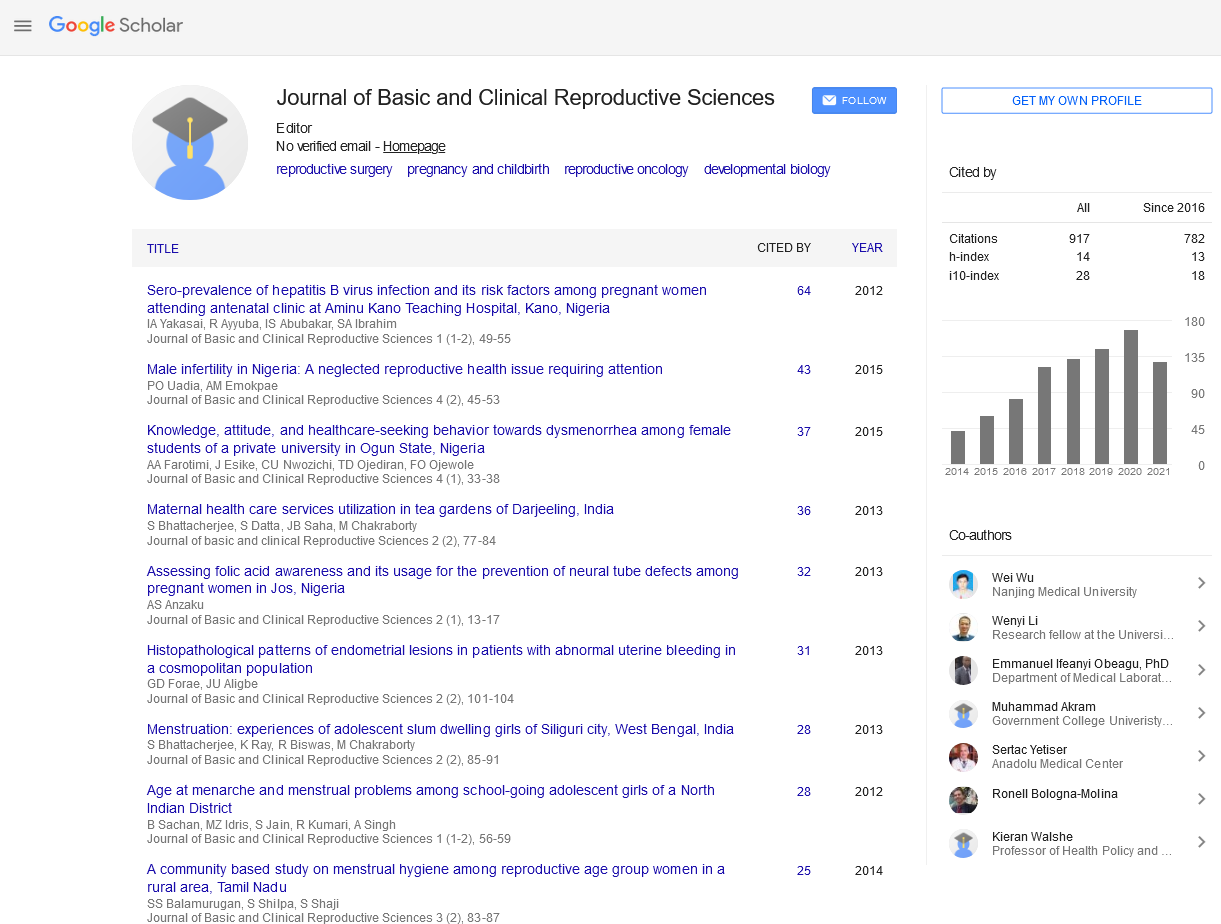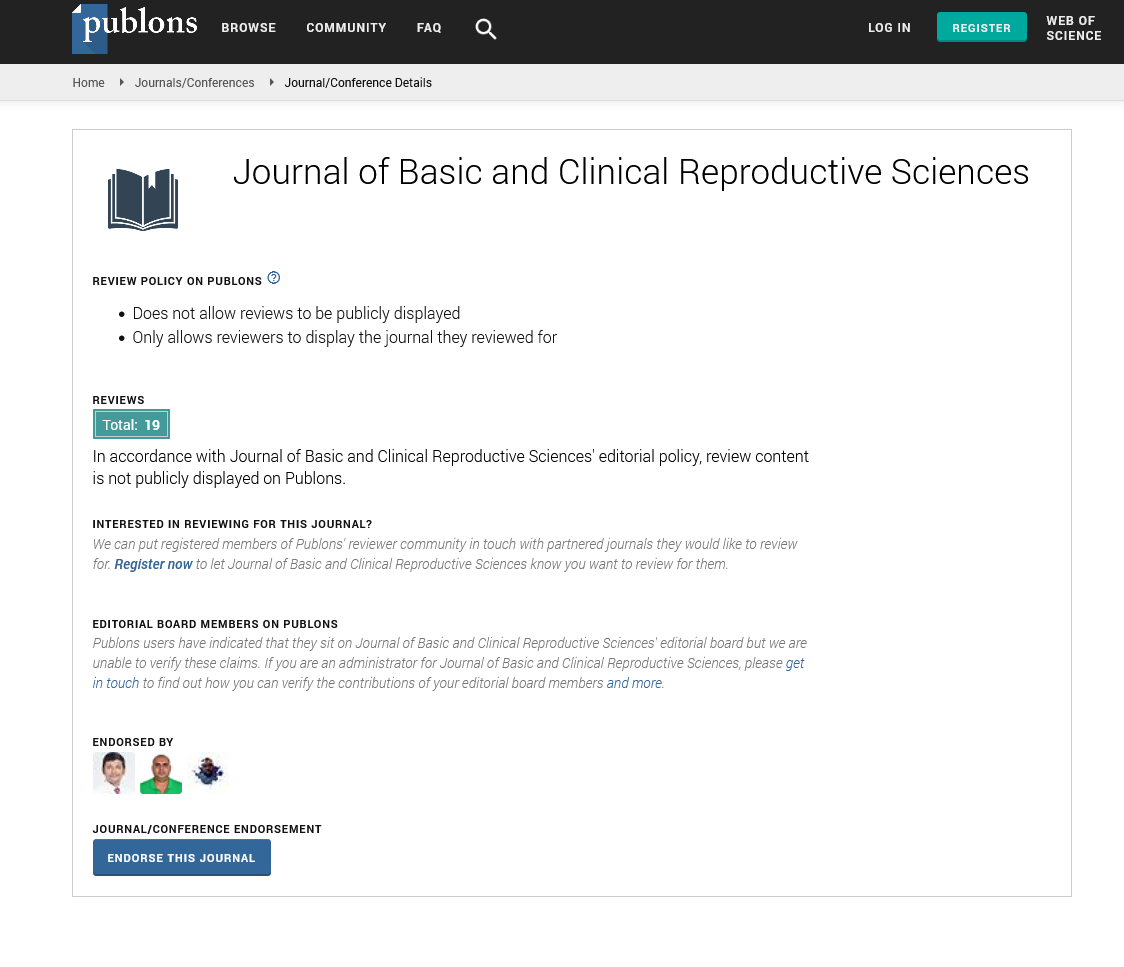Commentary - Journal of Basic and Clinical Reproductive Sciences (2023) Volume 12, Issue 4
Endocrinology of Testosterone: A Comprehensive Analysis of Physiology and Related Disorders
Received: 31-Jul-2023, Manuscript No. JBCRS-23-114418; Editor assigned: 02-Aug-2023, Pre QC No. JBCRS-23-114418 (PQ); Reviewed: 16-Aug-2023 QC No. JBCRS-23-114418; Revised: 23-Aug-2023, Manuscript No. JBCRS-23-114418 (R); Published: 30-Aug-2023
This open-access article is distributed under the terms of the Creative Commons Attribution Non-Commercial License (CC BY-NC) (http://creativecommons.org/licenses/by-nc/4.0/), which permits reuse, distribution and reproduction of the article, provided that the original work is properly cited and the reuse is restricted to noncommercial purposes. For commercial reuse, contact reprints@pulsus.com
Description
Testosterone is a vital hormone that plays a crucial role in male and female physiology. Testosterone is primarily associated with male development, but it also plays essential roles in females. It influences a wide range of physiological processes, including sexual development, muscle mass, bone density, and mood. It is responsible for the development of male sexual characteristics during puberty, such as facial hair, deepening of the voice, and the growth of the Adam’s apple. In males, testosterone stimulates sperm production and maintains the health of the testes. In females, it contributes to libido and fertility. Testosterone promotes the growth and maintenance of muscle mass and bone density in both sexes. Testosterone has an impact on mood, cognitive function, and emotional well-being. Low levels have been associated with mood disorders and reduced cognitive abilities. It influences fat metabolism and may impact body composition and weight management. Testosterone promotes the development and maintenance of muscle mass, contributing to physical strength and overall fitness. Testosterone plays a critical role in maintaining bone density, and low levels can increase the risk of osteoporosis and fractures. In both sexes, testosterone is essential for libido and sexual function. Imbalances can lead to sexual dysfunction testosterone is a hormone with a significant impact on various aspects of health, from physical to psychological well-being. Testosterone, often associated with male characteristics, has far-reaching effects on health in both men and women. Beyond its roles in sexual development and reproduction, testosterone influences physical, emotional, and cognitive aspects of well-being. This manuscript delves into the complex interplay between testosterone and health. Testosterone influences fat metabolism and insulin sensitivity, impacting body composition and the risk of metabolic disorders. Hypogonadism is the condition occurs when the testes produce insufficient testosterone, leading to symptoms such as low libido, fatigue, and muscle weakness. Elevated testosterone levels in women is Hyperandrogenism and can lead to symptoms like acne, hirsutism and irregular menstrual cycles. Hypergonadism can be caused by conditions such as Poly Cystic Ovary Syndrome (PCOS) or certain adrenal gland disorders. Treating the underlying cause may help normalize testosterone levels. In cases where the underlying cause cannot be treated directly, anti-androgen medications like spironolactone may be used to reduce the effects of high testosterone. Varicoceles are swollen veins in the scrotum that can lead to reduced testosterone production. Surgical repair of varicoceles may help improve testosterone level. Testosterone levels tend to decrease with age in both men and women, which can contribute to age-related health issues. Factors such as obesity, stress, and certain medications can influence testosterone levels.
Treatment
Testosterone Replacement Therapy (TRT): TRT is the primary treatment for men with clinically diagnosed low testosterone levels (usually below 300 ng/dL). It can be administered through various methods, including injections, gels, patches, implants, and oral tablets. In cases where the testicles are damaged or removed, TRT may be necessary. The choice of method depends on individual preferences and medical considerations. Clomiphene Citrate medication is sometimes used to stimulate the body’s natural testosterone production in men with secondary hypogonadism. Human Chorionic Gonadotropin (HCG) can also stimulate the testes to produce more testosterone and is sometimes used in combination with TRT. Anti-androgen Medications like spironolactone and oral contraceptives can help reduce excessive hair growth in women by blocking the effects of androgens like testosterone.
Hormone therapy: Individuals with Androgen Insensitivity Syndrome (AIS) may receive hormone replacement therapy to induce secondary sexual characteristics associated with their gender identity. In adolescents with delayed puberty, hormone therapy can be prescribed to induce the development of secondary sexual characteristics. Androgen Deprivation Therapy (ADT) is for prostate cancer treatment, ADT is often used to lower testosterone levels, as prostate cancer growth is sensitive to testosterone. This can be achieved through medications (LHRH agonists/antagonists) or surgical removal of the testes.
Conclusion
Testosterone is a hormone with complex effects on the body, and its balance is critical for overall health and quality of life. Medical supervision and informed decision-making are key elements in ensuring that testosterone-related disorders are effectively managed while minimizing potential side effects and risks.


